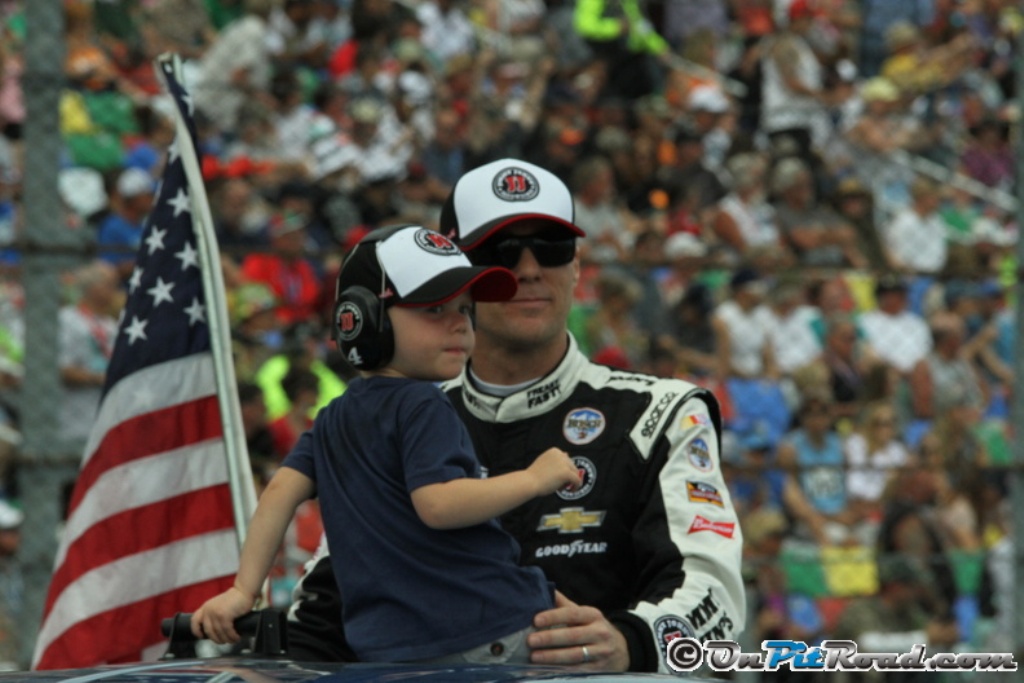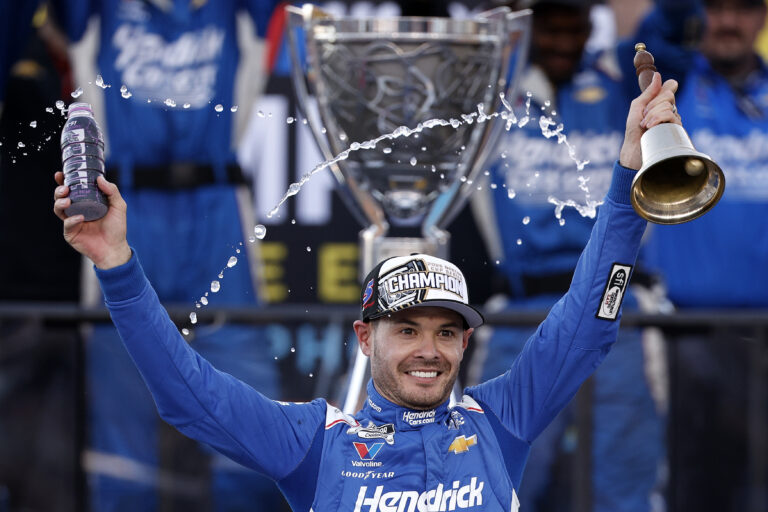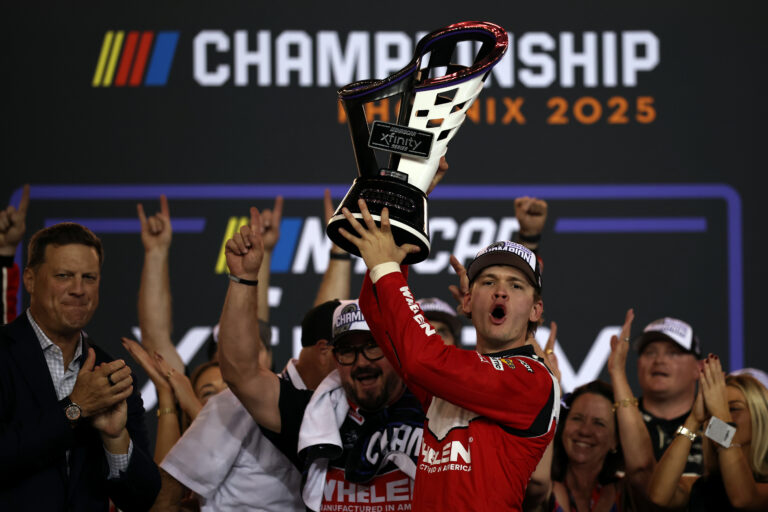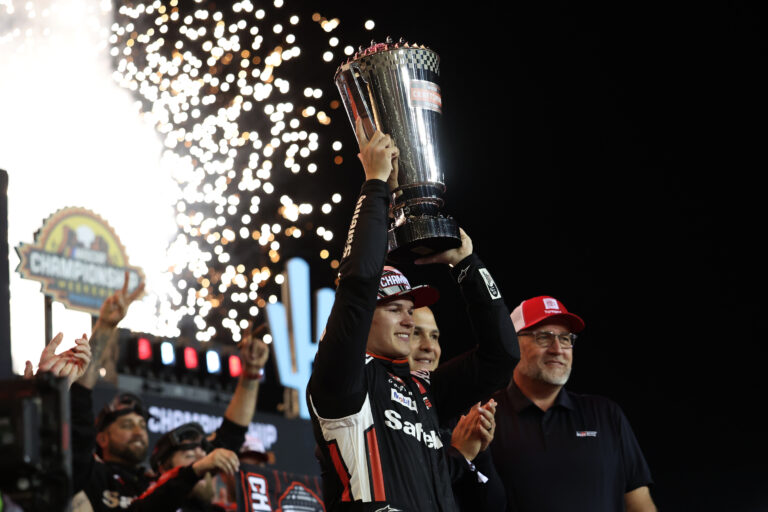
Photo Credit: Noel Lanier
NASCAR WIRE SERVICE —- HARVICK GIVES HIGH MARKS TO NEW SPRINT CUP AERO PACKAGE
FONTANA, Calif. – Kevin Harvick came from the 18th starting position to win by a nose last Sunday at Phoenix International Raceway.
It took Harvick 169 laps to get to the front. It took eventual fifth-place finisher Dale Earnhardt Jr. 75 laps to get from the 26th-place starting position to the front of the field.
Those impressive runs from mid-pack to the lead are a testament to the effectiveness of the low-downforce aerodynamic package NASCAR introduced into the Sprint Cup Series in 2016 as the full-time configuration on open-motor tracks.
“As a driver, especially last week, when you look at myself and Dale Jr., and you look at the way you could go through traffic, it seems like the cars were affected a lot less by the aero push and being around each other,” Harvick said on Fridaymorning at Auto Club Speedway, site of Sunday’s Auto Club 400 (3:30 p.m. ET). “They seemed a lot less dependent on where you are in the field.
“Obviously, they’re still not going to be as good as they were if you were the lead car, but I think we’ve definitely made some headway.”
Harvick expects more of the same in Sunday’s race at the rough, high-speed two-mile track.
“I think there’s obviously a lot of notes that have been gathered and, from a driver’s standpoint, I think this is the race we’ve all been looking forward to the most, just because of the fact that you have some high speeds and lots of racing lanes and the cars are going to slide all over the place,” Harvick said.
“So it’s definitely a weekend that we’re all looking forward to. This has probably been one of our better races over the past several years, so it’s going to be a fun weekend.”
A winner at Fontana in 2011, Harvick was third fastest in Friday’s opening Sprint Cup practice, as drivers concentrated on fine-tuning their qualifying setups.
A ROUGH, DIFFICULT RACE TRACK
The rougher a track is, the more drivers seem to like it.
That’s certainly the conventional wisdom at Auto Club Speedway, which features pronounced bumps on the backstretch, abrasive asphalt and distinct seams between the racing lanes.
“You could write a book about a lap at this place,” said Carl Edwards, runner-up to Kevin Harvick by .010 seconds last Sunday at Phoenix. “There’s so much happening out there—where you place your tires, how you enter the corner, what the guy in front of you is doing. All of those things add up to a lot different balance. Turns 1 and 2, as many times as I’ve been here, I still don’t feel like I have it figured out.
“There’s spots that I like to run, there’s things I like to do, but there’s some spots out there and it’s like, man, I can’t quite figure out what’s happening. When you hit this point in the race track and the car moves and I can’t repeat it all of the time, so you never really know what you’re going to get. I think that’s good. It’s a little bit unpredictable, it’s definitely tough and, to me, that’s part of the fun.”
Edwards, however, didn’t have as much fun as he would have liked during Friday’s opening NASCAR Sprint Cup Series practice. He was 25th on the speed chart, and he pointed to a dilemma that can haunt drivers and crew chiefs at the two-mile track: Whether to change the car or change your racing line?
“Your car can drive terribly, and then you can move around a little bit and it drives pretty well,” Edwards said. “So then you’ve got to decide, ‘Well, is that where I want to race, or do I want to race over here where it’s terrible? Should we work on it?’
“It’s tough. It’s hard to decide exactly what you want. The fun is that you can actually change it. You can do things. If the car isn’t working well in one spot, you move somewhere else and try something else. You’re not locked into a tiny little box where everybody has to run in the exact same spot.”
DILLON LEARNING FROM A SIX-TIME CHAMPION
One of the best ways to enjoy success is to emulate someone who already is successful.
That’s the approach Austin Dillon is taking in the early stages of his NASCAR Sprint Cup Series career.
Dillon has observed just how meticulous six-time series Jimmie Johnson continues to be in his preparation for each event and has adopted a similar approach. The driver of the No. 3 Richard Childress Racing Chevrolet uses a data analyst who helps him with the minutiae of racing.
“(He) really helps me as far as my driving abilities and just looking over different throttle traces and brake traces and just trying to take advantage of all that,” Dillon said on Friday after opening Sprint Cup practice.
“Jimmie Johnson, he studies every weekend, even though he keeps winning. He studies before every race, and we’re studying hard right now.”
Clearly, the homework is paying off for Dillon and crew chief Slugger Labbe. Dillon put the No. 3 Chevy on top of the speed charts in the opening practice session with a lap at 188.511 mph.




